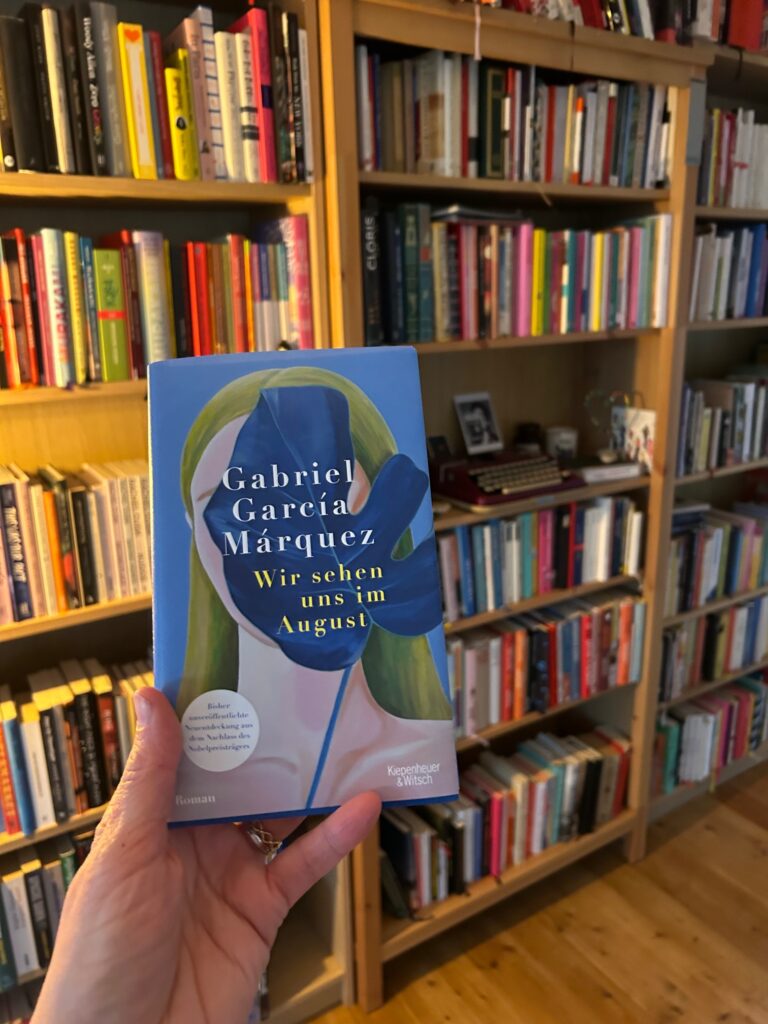
“She had repeated this trip every August 16 at the same time, with the same taxi and the same florist, under the fiery sun of that destitute cemetery, to place a bouquet of fresh gladioli on her mother’s grave.”
Until August (Wir sehen uns im August) by Gabriel García Márquez (translated by Anne McLean) revolves around forty-six-year-old Ana Magdalena Bach and her annual visits (on the 16th of August) to the island where her mother is buried. Ana’s itinerary includes a visit to the cemetery where she places a bouquet of her mother’s favorite flowers and indulges in a one-night stand with a different man every year before she returns to her family – her musician husband of over two decades and her two adult children. One of her trysts ends in a humiliating gesture and she carries both the emotional and physical reminder of the same through the years. Every visit to the island and her experiences with the men she meets inspires her to reflect on her actions, her marriage and her family. In sparse prose we are given insight into her motivations, her internal conflict and her desire in a journey of self- explorations with a thought-provoking ending.
A departure (in terms of theme and approach) from the nature of Gabriel García Márquez’s more famous works, this is not the author at his best but for those of us who have enjoyed the author’s work in the past, it won’t be difficult to appreciate the segments that shine with the author’s brilliant writing. But sadly, that is all we can expect from this short novella. I have no doubt had this manuscript been developed into a full-length novel with well-fleshed-out characters, and their motivations and relationships explored deeper; this would have been a worthy addition to the author’s oeuvre.
Please read the Preface to the novel where the author’s sons discuss their decision to publish this novella posthumously despite his wishes to discard the draft manuscript. A segment of this novella (translated by Edith Grossman) was previously published (1999) in the form of a short story.
Releasing a posthumous work by a beloved author will always be a fraught exercise, even more so when the author in question is widely considered one of the 20th century’s best. Pre-publication hype is countervailed with confected outrage about ‘betraying’ the author’s wishes.
Gabriel García Márquez did not think Until August ready to be published, but it is by no means ‘rough’ or incomplete. Per the explanatory notes, this was the fifth draft. It may not have been perfectly polished to the author’s highest standard, and there is a suggestion that it was intended as a part of a larger whole — a cycle of novellas — yet it works just fine as a standalone story and is not some kind of inferior work.
That said, if you have not read García Márquez before, don’t start here. Until August is not characteristic of his famous style, containing no magical realism (although you could argue the book’s ending contains just the slightest hint) or baroque prose flourishes. The style is spare and pared back, the story simple and repetitive in the manner of a piece of music. The overall effect is of old-fashioned charm and elegance mingled with tawdriness, like evening wear scented with sweat and booze. It is a very short work (despite claims of ‘novel’ on the cover), barely cracking 100 pages, and that is with large type and wide margins.
I can remember reading One Hundred Years of Solitude and a switch flipping in my brain: books can be this? It felt like graduating to an entirely different level of reading experience. Until August is not likely to have that effect on anyone (what an incredibly high bar!) It feels like what it is: a minor work of a master.